Ubuntu Kids
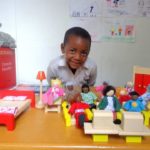
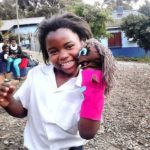
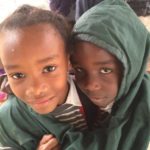
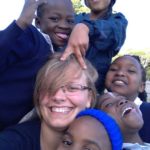

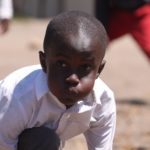
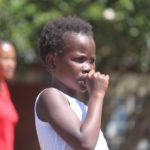

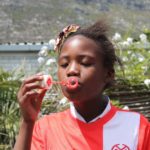
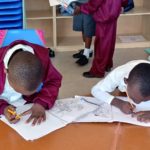
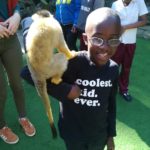
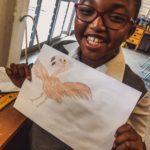

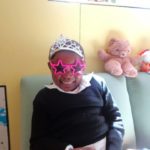
At Hout Bay Primary School
In this project we cooperate with the Hout Bay Primary School.
Support classes in English are of particular importance at Hout Bay Primary School. Although English is one of the official languages of South Africa, the reality is often different. The students mainly speak isiXhosa or other home languages at home, so that they only come into contact with the English language when they enter school life. In order to facilitate this introduction for the students, we identify competencies and deficits and try to work on these as best as possible in remedial classes.
In groups maximum seven students from each class, we work for about 30-45 minutes on a wide variety of topics. These vary from elementary ABC exercises and games to more complex grammar exercises. We can also be found providing support in the classroom.
Our remedial classes start at 9 a.m. each day by going through the classes, picking up our students, and starting the remedial class together in the computer lab. The students’ deficits in English are large, meaning that we more or less have to start from ‘zero’ most times. You have to completely detach yourself from German standards. You should expect to achieve small successes in a playful ways and adjust the learning speed accordingly. You will quickly notice that the students enjoy coming to our remedial classes and that progress is made in the long term.
Brenda Moloto will work in this project from January 2023 on. She will be in constant contact with the school management and the teachers and will be a bridge to our After Care. The volunteers and interns will work under her care in a meaningful and purposeful way. She will also begin to do social work under supervision.
Oxford Reading Buddy
In the mornings and afternoons we do not only work in small groups, but also one-on-one with individual students. Here we work with a computer program called the Oxford Reading Safari. The goal is to improve the children’s English reading and text comprehension and to expand their vocabulary.
Every day we take the children out of class for about 30 minutes and work with them on the computer. The program is designed to be child-friendly and easy to use.
From the program booklet: “While the child practices reading, he or she goes on an adventure to a wildlife park. As they read, they earn points that allow them to see different animals and birds in the wildlife park.” The focus here is not on completing the tasks without errors. Rather, mistakes are treated as positive, they are worked on intensively and the learning progress is shown directly.
The best thing about the program is the quick learning effect. The feedback given by the program after completion of a task motivates and inspires the children to learn and do better next time.
Due to Corona, the reading program had been at a complete standstill until now. It is back up and running again however, and can be found under: www.oxfordreadingbuddy.co.za
The aftercare
Many children are left alone at home after school hours because their parents work until the late afternoon. To prevent the youngsters from being unsupervised for several hours, Ubuntu offers Aftercare from 1:30 p.m. to 4 p.m. Monday through Friday for about 35 children.
The aftercare team consists of Andiswa, Kayakazi and Zwaai. Two women and one man. The three of them reorganized the Aftercare during COVID to work without volunteers as well and put it on a stable footing. In the meantime, our international volunteers and interns are actively helping again.
Punctually at the school bell, the children of the 1st grade are the first to arrive for aftercare. As time passes and classes end, the rest of the Ubuntu kids arrive and the program can begin: Card games like Halli Galli, drawing with wax crayons or simply playing soccer – the kids love doing everything we offer.
For the older children of the 2nd and 3rd grade, the afternoon begins with homework. You will hear: “Teacher, can you help me with my homework?”, and of course the team including the volunteers gladly oblige.
Wednesday is sports day on the sports field, on Fridays we go to the beach if the weather allows and on Thursdays, 10 children go to occupational therapy on horseback. In addition, we bring the talents of our volunteers into the program: Jarla, for example, taught children’s yoga and our soon to be teachers from the University of Dortmund have made learning games in the past; the social work students often give life skills training.
When children have secrets or are sad and desperate, they are listened to. If a child urgently needs extra support, for example if there was not enough time during the day for Reading Gym, the staff will make time for that as well.
To check attendance, a “Circle” is formed once a day. In between, a snack is handed out. Afterwards, a few group games are played to strengthen the sense of community among the group. After that, everyone goes back to their activities, be it playing “Hide and Seek” or dancing to Xhosa music. Shortly before 4pm, it’s “pack up time” and when everyone has diligently cleaned up, our staff escorts the children home to the township….
No matter what the children do at Aftercare, they always radiate an infectious joy for life. And that is exactly the purpose of the project: to give love and care and to get the children off the streets where dangers lurk.
During COVID, we had to give up our Aftercare room unfortunately. The school needed more classrooms for smaller classes. We searched and negotiated for a long time and finally found a room in the neighboring Adult Education Center: Not ideal because we have to share the space with other (church) groups. The children have to be quiet because there are other groups in the building at the same time. Also, the room is too small for 35 children. However, we were diligent and raised money for our own building. The even more difficult part was to find a piece of land for our new aftercare. But we managed to do that as well. We were offered a plot on the property of the Adult Education Center. In November, the construction or rather the placement of the containers can begin! It will be a construction of several shipping containers. This is ideal for us since it allows for expansion. Depending on the financial situation, we could for instance add containers to build a ‘2nd floor’.
